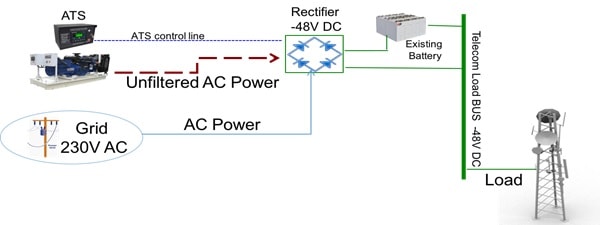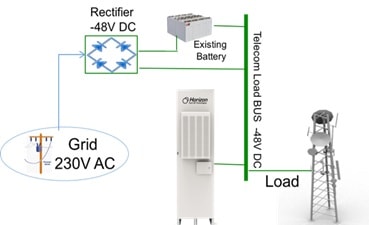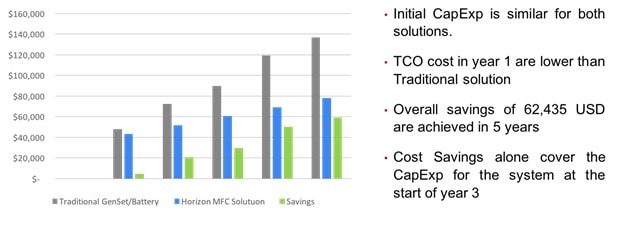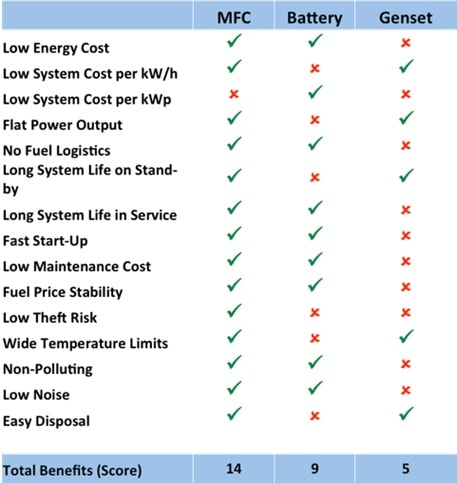The opportunity for Fuel Cell deployment is well understood in the Telecommunications sector, with such benefits as lower weight and space occupancy, lower maintenance needs, reduced fuel logistics together with the environmental cleanness of Fuel Cells demonstrating their advantage over legacy technologies such as batteries and diesel generators.

Reducing Existing OPEX – Diesel Generators (GenSet)
A significant portion of BTS OPEX is the maintenance requirement of GenSet’s. Frequent oil changes, air, oil, and fuel filter maintenance, cooling system and belt maintenance, and maintaining the condition of the starting battery add significantly to site OPEX. Scheduled maintenance of the MFC system by comparison only consists of two air filters, which are washable and typically need to be changed once a year.
GenSet’s for telecom applications are over dimensioned because larger generators have higher reliability, are more difficult to steal, and can accommodate higher inrush currents. Peak efficiency of these GenSet’s often exceeds 20%, but efficiency quickly drops to less than 10% at power levels below rated output. Therefore, in most telecom applications, the GenSet will spend a large portion of time operating at low efficiency.
In contrast, an MFC system load follows and operates at over 50% efficiency and, because the output is more closely matched to the load, the system spends a majority of time operatingt high efficiency.
The simplicity and low number of moving parts in a fuel cell system contribute to high reliability and low levels of vibration transmitted to surrounding structures.
Additionally, an operating MFC generates very little noise, which enables the system to be located close to offices or residential neighborhoods.
Reducing Existing OPEX – Batteries
Power output of a fuel cell system is Direct Current (DC) and therefore directly compatible with BTS telecom gear and DC air conditioners, avoiding losses from DC to AC inverters. An additional benefit of replacing an AC generator (i.e., a GenSet) with a MFC system is the possibility to decrease both the number of rectifiers and the size of the battery bank because the characteristic power surge from the AC generator is eliminated when the DC fuel cell system generator is implemented.
The traditional telecom solution is to implement large battery strings – typically 400 or more amp-hours capacity – of VRLA (valve regulated lead acid) batteries for backup. These large battery strings require air conditioning systems for cooling, and the associated air conditioners consume high amounts of power – typically 40% or more of the entire BTS load is for air conditioning. VRLA batteries have a short lifetime (< 3 years) if not maintained at 25◦C and are often also the target of theft in addition to diesel fuel.

In contrast an MFC fuel cell system starts quickly and operates efficiently while following the load, thereby foregoing the need for a large battery bank. Typically only a relatively small bridging battery of 100 to 150 amp-hours is required to carry the load while the fuel cell system is starting, resulting in a 60% or higher reduction in battery capacity.
Total Cost of Ownership (TCO)
Horizon Fuel Cell Technologies utilizes a Typical TCO (total cost of ownership) approach in evaluating the suitability of an MFC system for each application.
Typical TCO analysis includes comparing an MFC to the existing capital and operating costs of all relevant site equipment including generators, batteries, and cooling equipment, as well as an evaluation of the total site energy requirement. In this way, the costs and benefits of an MFC solution can be compared to traditional approaches (large batteries, diesel generators, cycle charging, etc.) for various operational scenarios.
The output from a typical TCO for the South Asia region is shown. The site in question has a power requirement of 3kW and currently experiences grid outages of 40 hours a month ranging from many interruptions lasting a few minutes with outages of up to 8 hours in some cases.
During certain times of the year the local utility also imposes enforced outages of up to 12 hours a day during periods when regional consumption of electricity stresses the grid.

On the TCO analysis the costs of implementing an MFC based backup power system compared to using existing technology had a similar CAPEX cost however, savings on diesel fuel cost, GenSet maintenance and battery substitution resulted in overall savings of over 44,000 USD in five years and 104,000 USD in 10 years.
The study has also shown that the payback of the CAPEX of the MFC over a GenSet and ancillary’s is less than two years and if the benefits of the improved site reliability are included, the payback period is significantly accelerated.
Savings: thanks to its high efficiency the OPEX are very low and the TCO lower compared to legacy technologies (diesel gen. + batteries).
No fuel theft: H2 cannot be used for traditional uses such as powering/ heating houses or running cars.
OPEX independent from fuel price volatility: the main energy source is Methanol, widely used in Industry and whose cost is historically far less volatile than the cost of diesel/oil/gas.
Easy and low-cost maintenance: the system is fully remotely managed, there is NO NEED for on-site checks. A Self test procedure verifies the status of all the components while a pressure meter monitors H2 storage.
No Noise and small foot print means more opportunities to deploy system in VIP sites or restricted space locations.
In addition to the OPEX cost savings of low maintenance and high efficiency, the use of the MFC as backup power solution will induce additional indirect savings:
- Improve site availability: increase revenues generated by site.
- Space saving: the footprint of the MFC is less than a GenSet and fuel tank.
- Rectifier redundancy saving: since the fuel cell sys- tem is a standalone DC power system it will not only back-up the grid supply but also rectifier in case of failure.
- Reduced number of rectifiers: since the current surge from the diesel generator is eliminated.
- ATS cost saving: Fuel cell system does not required the use of costly and unreliable automatic transfer switches.
- Battery recharging cost: Power consumption cost to recharge batteries and maintain the floating voltage is eliminated.


 In contrast an MFC fuel cell system starts quickly and operates efficiently while following the load, thereby foregoing the need for a large battery bank. Typically only a relatively small bridging battery of 100 to 150 amp-hours is required to carry the load while the fuel cell system is starting, resulting in a 60% or higher reduction in battery capacity.
In contrast an MFC fuel cell system starts quickly and operates efficiently while following the load, thereby foregoing the need for a large battery bank. Typically only a relatively small bridging battery of 100 to 150 amp-hours is required to carry the load while the fuel cell system is starting, resulting in a 60% or higher reduction in battery capacity.
 On the TCO analysis the costs of implementing an MFC based backup power system compared to using existing technology had a similar CAPEX cost however, savings on diesel fuel cost, GenSet maintenance and battery substitution resulted in overall savings of over 44,000 USD in five years and 104,000 USD in 10 years.
The study has also shown that the payback of the CAPEX of the MFC over a GenSet and ancillary’s is less than two years and if the benefits of the improved site reliability are included, the payback period is significantly accelerated.
On the TCO analysis the costs of implementing an MFC based backup power system compared to using existing technology had a similar CAPEX cost however, savings on diesel fuel cost, GenSet maintenance and battery substitution resulted in overall savings of over 44,000 USD in five years and 104,000 USD in 10 years.
The study has also shown that the payback of the CAPEX of the MFC over a GenSet and ancillary’s is less than two years and if the benefits of the improved site reliability are included, the payback period is significantly accelerated.
